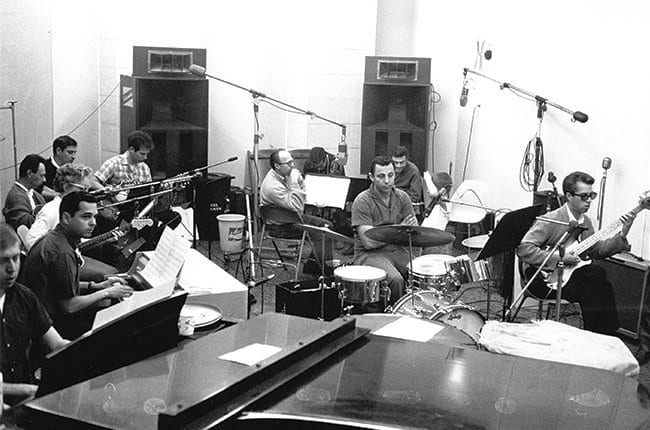So you’ve got a song written, you’re ready to bring it to life in the studio – but maybe you’re not the best drummer. You don’t have your own band, but you want your recording to be more than just a basic acoustic demo. What do you do now? It might be time to hire a session musician.
What Are You Even Talking About?
Session musicians are players who are hired on a temporary basis, to add something to your songs. This is often an ideal situation for singer/songwriters, who might not have a backing band of their own. Most pop songs employ session musicians, as pop stars usually only contribute vocals to their songs. This leaves their producer to fill out the rest of the tracks. Then the pop star will get paid 100,000 times more than the actual musicians who performed on their song. Karma will get them in the end.

A group of Los Angeles session musicians called The Wrecking Crew played on hundreds of hit songs in the 1960s.
How Do I Find A Session Musician?
Craigslist is a great resource for people looking for work. You can post a wanted ad that includes your timeline, your musical style, and how much you plan to pay. It should also be established ahead of time how much time you expect them to commit to your project. If you want them to practice their parts in advance, you should specify that, and how much you plan to play them for it.
Another great resource is Fiverr. For as little as $5, some musicians will be willing to record their parts at home and email them back to you. However, you often don’t have much control over what they give you, so using someone you can meet up with in real life is probably a safer bet.
You might also want to consider approaching local musicians after shows, and asking what their rates are for studio work.
How Much Should I Pay?
It should be worked out beforehand how much you’re willing to pay your session musicians. Some players prefer to work for an hourly rate, to ensure that they’re being compensated for the amount of time they put into your project.
Other players might be willing to work with you on a per-song basis, setting a flat rate for their work on each song.
If you’re a well-known songwriter, some musicians might ask for a royalty share in your song. This means that they will continue to receive a percentage of whatever profits the song makes. This is probably only a good idea if you’re an established writer, with radio play, and you both have good lawyers. Otherwise, you might want to keep things to a flat rate.
Make sure that it’s clear to everyone what you’re paying BEFORE THE WORK STARTS. Miscommunications happen in the studio all the time, and it’s important that you don’t end up in court over a simple human error. Write up a contract, and have the players sign it. Judge Judy will hate you if you don’t.

What Will They Play?
Here’s something else to consider: do you expect them to play exact notes, which you will have to dictate to them? Or do you want them to make up their own parts? This will depend on both of your needs. If you’re hiring someone to play a guitar solo or piano part on your song, you probably want them to play something improvised; but if you’re hiring someone to play drums or sing harmonies, you probably have an idea of what you expect from them.
Talk to them about their preferences and abilities, and make sure you’re comfortable with their level of performance BEFORE your session.
Also, if you’re going to be really picky about what they play, that’s cool – but maybe consider increasing their rate for that reason. Letting them know up front, “I want you to play exactly what I’m asking for, so I’m going to offer you $xx to do that” can go a long way in building morale and keeping everyone on the same page.
